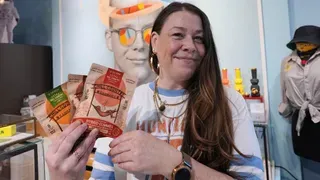September 28, 2011
LGBT North Carolinians Fight Back Against Proposed Super-DOMA Amendment
Winnie McCroy READ TIME: 5 MIN.
North Carolina's LGBT community continues to come together to fight a super-DOMA referendum that the Republican-controlled General Assembly approved earlier this month.
Amendment One will appear on the May 2012 primary ballot. And although a majority of North Carolinians supports gay civil rights, some activists believe it may be difficult to mobilize them to vote on the issue.
"I am not surprised that we are getting this on the ballot because we have a Republican-controlled House and Senate," said long-time LGBT activist Mandy Carter. "The likelihood of Republicans getting the win at the primary election means lots of folks are not going to come out and vote. The bottom line is, just like interracial marriage, this issue is going to eventually end up in the Supreme Court."
The measure is what Pam Spaulding, publisher of the popular LGBT blog Pam's House Blend described as a pet project of State Sen. James Forrester (R-Gaston)-he has introduced the bill at the beginning of every legislative session for the past eight years. The amendment would ban marriage, domestic partnership and civil unions for same-sex couples in the Tar Heel State.
Nuptials for gays and lesbians are already banned in North Carolina, but Amendment One would codify it in the state constitution. Thirty other states have enacted constitutional bans on marriage for same-sex couples.
Similar measures have met with a quick death in the state Legislature that has been Democratic-run since 1870. This year, however, Republicans wrested control of North Carolina's legislature, and spirited the proposed amendment through both the House and Senate without any outside debate.
"This time he [Forrester] knew he would get some traction," said Spaulding. "He changed the language and tacked it on to a bill about term limits on state senators for chamber leadership, and slipped it into the docket. They took it to the floor for debate without any public comment, refused to let experts testify, took it to a vote, and passed it. It was done in the same way in the Senate the next day. This was all done in a very devious fashion, which makes me feel it wouldn't stand up to public scrutiny and debate."
LGBT North Carolinians Fight Back
The LGBT community has already begun mounting a response.
Various city and county leaders have joined in protests against the amendment. Openly gay Facebook co-founder Chris Hughes pledged to donate $10 to Equality North Carolina for every new "like" on their Facebook page. Lesbian country singer Chely Wright has appeared at a recent Equality North Carolina rally.
LGBT North Carolinians have also held protests and vigils-and Alex Miller, interim executive director of Equality North Carolina, even debated state Rep. Dale Folwell(R-Forsyth) on the measure.
"The real thrust and point of that debate was that the proponents of the amendment are lying... the amendment outlaws civil unions and domestic partnerships of all kinds," he said.
Other followed, including a Sept. 21 debate between Minority Whip Rick Glazier (D-Cumberland) and House Majority Leader Paul "Skip" Stam (R-Wake) at the University of North Carolina School of Law. The ACLU of North Carolina recently posted a help wanted ad for "a full-time employee to coordinate our efforts to defeat the proposed anti-LGBT amendment to our state's constitution on May 8."
"There is a lot of open discussion on this...but we're now at the position where we are gunning up to see how much money will be thrown at this issue," said Spaulding. "In terms of the LGBT community, we need a lot more help than just from the inside."
Miller said his organization is taking time to plan their strategy before mobilizing supporters in North Carolina and around the country. "We want to be deliberate about it and make sure we have the right strategy," he said.
According to Matt Comer, editor of the LGBT newspaper QNotes that covers the Carolinas, the Human Rights Campaign and other national organizations have already sent organizers to Raleigh and Charlotte. Everyday North Carolinians are also doing their part.
"One thing that is very interesting about North Carolina is how average citizens stepped up and began their own advocacy campaigns among friends and colleagues," said Comer. "This state traditionally takes politics very seriously, with a high level of significant engagement and a progressive social justice history. Hopefully by the May ballot all of those characteristics will coalesce, and maybe turn out enough voters to defeat the amendment."
Spaulding: Amendment One Bad for N.C. Businesses
Amendment One opponents are quick to point out what they describe as its unintended consequences.
Miller stressed while the measure would outlaw domestic partnerships; it could also compromise widows who rely on veteran's benefits, unmarried straight couples with wills, trusts or advance directives, and those seeking protection from domestic violence. The amendment may also discourage Bank of America, Duke Energy, BB&T and other large North Carolina-based corporations who offer their employees domestic partner benefits from expanding in the state.
"There is a reputation that North Carolina politicians will discriminate, but really it is just a subset of a fringe of bigoted legislators who have wanted to do this for a long time, and now have the critical mass," said Spaulding. "Other legislators realize it's bad for business, but they are voting with it because they are afraid of what people back home will think if they don't, and feel beholden to the evangelical right."
Comer expects that Republican turnout for the referendum may be higher than normal if the GOP has yet to select a presidential candidate. Miller remains hopeful that Equality North Carolina's outreach efforts can counter what he describe as Republicans' mistake by threatening domestic partner benefits.
"It really comes down to our get out the vote effort verses the proponents' efforts," he said. "It's going to be a turnout election, meaning that we just have to identify voters who are supportive and get them informed on how they can defeat it."
Fighting for Marriage, With a Nod to Past Struggles
Carter acknowledged with a sigh that marriage often motivates voters more than other issues.
While pleased with the outpouring of support against Amendment One from local and national organizations, Carter pointed out basic job protections and other basic civil rights are still not accessible to LGBT North Carolinians.
"Our LGBT movement is at an important crossroads," said Carter. "We are going to get what we want-'don't ask, don't tell', marriage equality, but what we don't have is ENDA [Employment Non-Discrimination Act.] People need jobs."
"This is institutionalized discrimination," added Spaulding. "Public policy polling shows that 56 percent of people in North Carolina favor some recognition for gays; not marriage, but basic rights. And they do not favor passing this amendment."
Although Carter will join the fight, she is not blind to the amount of money LGBT organizations have spent on marriage equality-funds that could have been better spent on ensuring that North Carolinians can acknowledge their sexual orientation without the fear of losing their jobs or housing because of it.
"We need more people here out of the closet and able to talk to the neighbors about being gay," said Spaulding, referring to ENDA. The fact is at the national level, there is so much attention given to marriage...but ENDA rises to the top of the rights that people need now. We need to put a stamp on discrimination; we need to slap it down now."
Winnie McCroy is the Women on the EDGE Editor, HIV/Health Editor, and Assistant Entertainment Editor for EDGE Media Network, handling all women's news, HIV health stories and theater reviews throughout the U.S. She has contributed to other publications, including The Village Voice, Gay City News, Chelsea Now and The Advocate, and lives in Brooklyn, New York.




